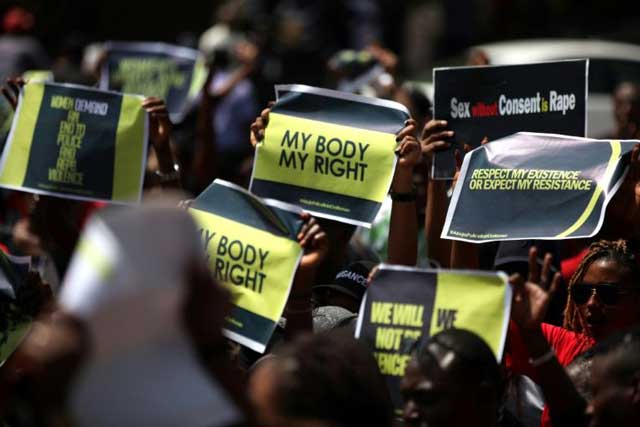
Lagos, Nigeria | AFP | A dozen officers are squeezed into the dimly lit Lagos State Police Gender Unit between worn desks and witnesses writing statements, as the force struggles to cope with an increasing number of reports of sex abuse in Nigeria.
Recent figures are scarce but according to the United Nations, one in four women in the country experiences sexual abuse before they turn 18.
Lagos is the only one of the 36 states in Africa’s most populous nation with a force dedicated to tackling gender-based violence.
Conditions in the unit — one of 12 serving the chaotic megacity of 20 million — are basic.
It has no interrogation room, no dedicated vehicle and no computers.
Wedged in a corner behind mounds of loose files, officers point to a small plastic chair where alleged victims — most frequently children, with many aged around just 10 — are brought to give statements.
“You can see, we’re just managing,” Detective Inspector Alaba Munisola, the head of the unit, told AFP.
“The number of reported cases has been rising and rising.”
Greater numbers of women are speaking out against prevalent sexual violence in the country, with both NGOs and police saying the number of reported cases has increased rapidly in recent years.
But this has exposed victims to the failings of an underfunded, poorly trained criminal justice system — often exacerbating their trauma.
NGOs and campaign groups say those who report crimes suffer prejudice, extortion and a lack of social support at each stage between reporting crimes and court trials.
Investigations into sexual assault rarely result in convictions.
The launch of a new nationwide sex offenders register has been described as an important step in helping to crack down on the worst abusers.
But activists insist it is just the beginning of the fight to reform the system.
“How the police record cases, information sharing, it’s ridiculous. It’s all in paper,” said Ayodeji Osowobi, director of the non-profit organisation Stand to End Rape.
“The register will help agencies identify repeat offenders, police will have more information when they deal with suspects.”
– ‘Buy justice’ –
Stand To End Rape, which has dealt with hundreds of cases this year, represents those who come forward and provides psychological support.
“For victims, when it comes to interfacing with the police, it’s one of the most dreaded experiences ever,” Osowobi said.
“What they do to survivors is not ask them questions but interrogate them.”
Osowobi said victims are often questioned in public or open spaces, or even in front of suspects they’ve accused.
Deepening their ordeal, officers regularly extort victims for money and delay the case if they are not paid.
“In most cases the police ask for a ‘mobilisation fee’, saying, ‘we need fuel, we need something to ginger us’,” Osowobi said.
Inspector Olakunle Orebe has worked in the Lagos Gender Unit since it was founded in 2015.
“Oftentimes there is not provision for basic needs, such as transportation, printing case files, visiting the scene to investigate,” he admitted, criticising police budgets.
He said suspects and victims have been transported by some police forces in the same vehicles and sometimes even in public transport.
“How will you now carry the survivor and the accused or the perpetrator inside one car?” he complains. “But it happens in places.”
“In this unit, we have so many challenges. We don’t want a situation where victims have to buy justice, so oftentimes, these costs come from our pocket.”
– Failed cases –
The judicial process for sexual assault cases takes two years on average and many victims who pursue prosecutions give up due to delays, Osowobi said.
“Archaic” data collection by police, with cases recorded on paper, often result in key details being misplaced, Osowobi said.
Uchenna Nwokedi, a consultant at the British Council in Nigeria, said cases also collapse due to a statute of limitations of just six years, as well as poor evidence collection.
For instance, many state doctors are not trained to collect evidence after an assault or to present it in a way that persuades judges.
One positive development has been an increase in Sexual Assault Response Centres — run by the government and supported by foreign donors — which act as a first point of call for victims.
“They can receive care, then whenever they are ready to prosecute, that evidence taken at the time of the incident is there” said Nwokedi.
Activists are also hoping that the offenders’ registers launched this week can provide a breakthrough.
Until now only two Nigerian states have kept a database of offenders with police forces in Lagos conceding it is irregularly updated.
The new register will be updated monthly by an initial 15 NGOs and be accessible to the public online.
It is aimed at bolstering background checks and will contain a section available only to law enforcement of suspects who are accused but not convicted so that subsequent allegations can be taken more seriously.
“There is still a lot to be done and for the government to do to address sexual violence,” said Nwokedi.
“But the register is a very important step forward.”
 The Independent Uganda: You get the Truth we Pay the Price
The Independent Uganda: You get the Truth we Pay the Price




